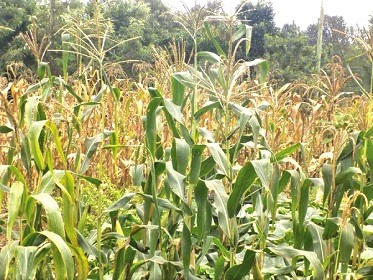
Bridging gap between productivity, food security
Ghana no doubt can be considered as an agriculture-dependent nation, although mechanised agriculture is still at its teething stage.
The country has unpredictable weather conditions, although agriculture is heavily dependent on rain (weather).
Advertisement
In recent times, adoption of modern agricultural technologies and cultural practices such as irrigation, fertiliser application, use of resistant varieties, good planting and harvesting times, among others are being resorted to.
The adoption of these modern practices are hindered by financial constraints as these farmers are smallholder farmers with limited financial support.
Moreover, commercial banks, private partners and insurance companies are not ready to support them adopt and apply these technologies.
Challenges in the agriculture sector are not only limited to cultivation, there are serious concerns when it comes to postharvest storage and marketing.
The major cause of food insecurity in Ghana is attributable to the greater percentage of postharvest losses.
Achieving food security requires that the aggregate availability of physical supplies of food is sufficient, that households have adequate access to those food supplies through their own production, through the market or through other sources, and that the utilisation of those food supplies is appropriate to meet the specific dietary needs of individuals.
Constraints
There are aggregated factors hindering agricultural growth, and these factors are discouraging farmers from investing and producing.
Some of these factors are limited access to changes in technology and existence of poor infrastructure.
Unfortunately, the diversity in the country’s agro-ecology has compounded these challenges.
Managerial skills
The agricultural sector having over 60 per cent of the population including farmers, traders and processors constitutes the largest sector.
Agriculture is also a critical sector for women; about half (48.7 per cent) of the total female population is self-employed in agriculture, with the majority being engaged in food production.
Although the current population of farmers are aging, the youth are not willing to engage in agriculture. The literates are not much engaged in agriculture, and therefore, dissemination of information, recent methods, regulations and policies are paramount.
Resource management
Agriculture in Ghana is based on natural resources, comprising of production of crops and livestock, wild life hunting, rain-dependent agriculture, and fish from natural water bodies.
Sustainability of natural resources are threatened by some practices such as burning of bush, the menace of the activities of galamsey and the improper use of modern technologies such as irrigation and agro-chemicals.
It is reported that, 69 per cent of Ghana‘s total land surface is considered prone to severe erosion and illegal mining.
Technology, dissemination
Low productivity in agriculture can be due to poor conditions of soils, irregular pattern of rainfall, disease and pest outbreaks, lack of access to good varieties of planting materials and seeds.
Lack of access to good market incentives and relevant inputs, limited access to processing technologies, transports, handling and storing of commodities of crop, fish, and livestock are challenging factors.
There is also limited knowledge in post-harvest management, most especially of perishable produce, resulting in high post-harvest losses of about 20 to 50 per cent for fruits, vegetables, roots and tubers, and about 20 to 30 per cent for cereals and legumes.
The women have been using materials and mostly weak commodity value chains.
Irrigation
Dry lands less than one per cent are using irrigation, and improper management of the present systems further limits their effectiveness. There are public irrigation systems that operate at approximately one third of their designed capacity. This has caused low yield and low cropping intensity because of lack of good operation and maintenance of irrigation facilities. Formal irrigation development is highly supply driven and its over-reliance has limited the areas under irrigation.
Infrastructure
Movement of agricultural commodities is a challenge as road and transport infrastructures are inadequate and poor.
This constraint particularly has retarded agriculture growth and development in some high potential areas.
Most feeder roads connecting farms to villages are very poor compelling farmers to carry their produce on their heads from farms to markets.
Poor road infrastructure also has a toil on cost of important inputs such as fertiliser. Most markets have limited infrastructures such as suitable commodity specific storage facilities, toilet facility, good and hygienic environment, accessibility by car or truck and limited space.
Market access
There is also limited marketing skills, limited processing and product development for good utilisation of raw materials and mostly weak commodity value chains.
The increasing consciousness of food safety and phytosanitary in international trade require a growing challenge to market access, especially for high value agricultural export commodities.
Majority of local consumers and producers have a low consciousness about food safety and this has caused farmers, processors and traders not to follow good practices in agriculture and manufacturing.
Food insecurity
Ghana faces eminent food insecurity as the average yield has not been growing. In almost two decades the importation of commercial food, and food aid have reached about 4.7 per cent of food needs.
Food production and availability per year is dependent on rainfall during and between growing seasons, and the level of production. This creates food insecurity at household levels, making community areas poor and chronically distressed.
Ghana is generally food secure, but there are pockets of food insecurity existing in all regions as a result of acute limited resources and limited alternative livelihood chances for most people to meet their dietary needs. Adverse weather conditions and limited farming inputs have had severe impact on smallholder farm enterprises.
The writer is the Registrar, Chartered Institute of Agriculture Ghana (CIAGH)




